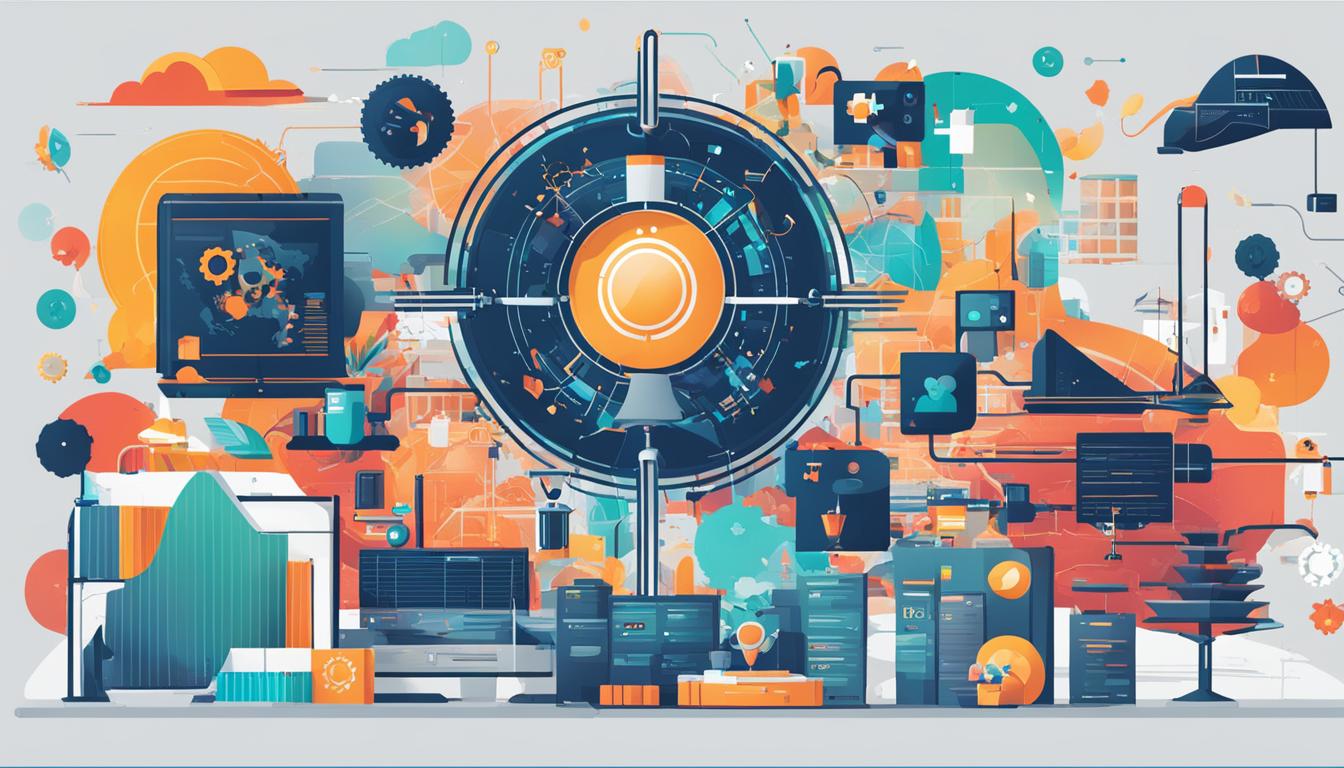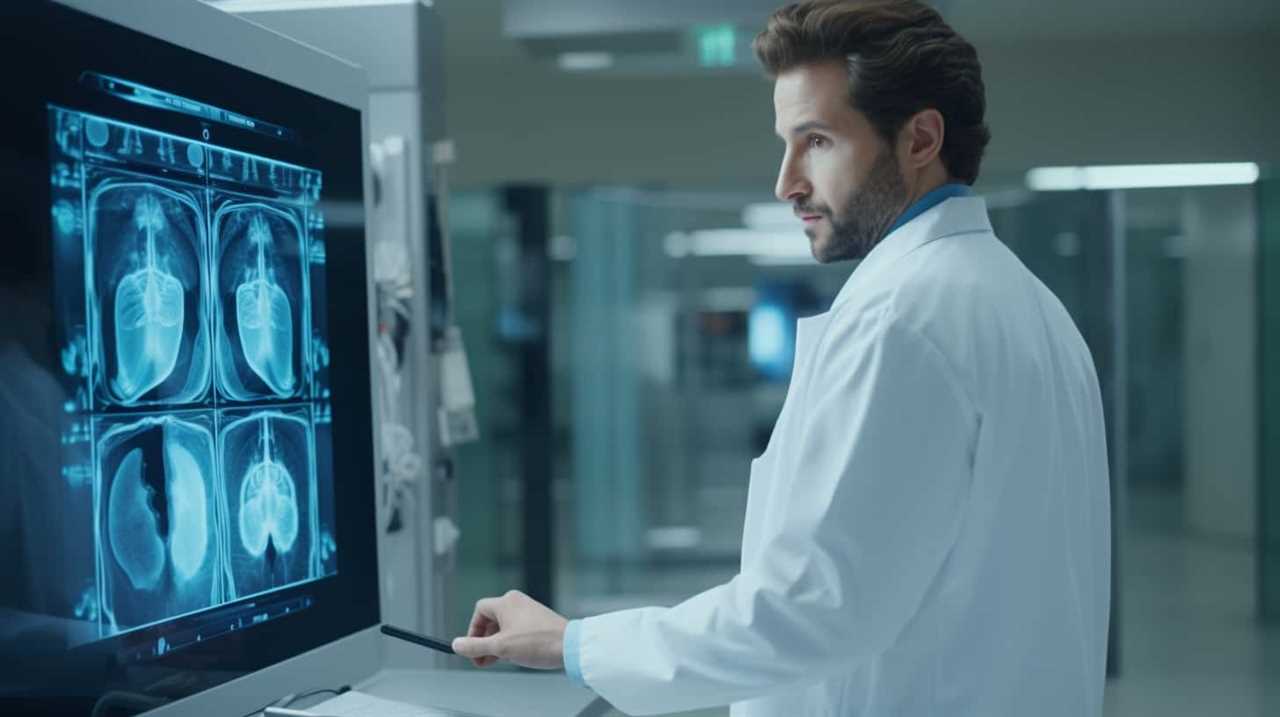Can AI truly revolutionize the healthcare industry?
We’ve all heard the buzzwords – artificial intelligence, machine learning, big data – but what does it all mean for our well-being?
Brace yourselves, because the future of healthcare is about to get a whole lot smarter.
With AI, we can expect improved accuracy in diagnosis and treatment, personalized medicine, streamlined administrative tasks, early disease detection, and groundbreaking advancements in medical research.
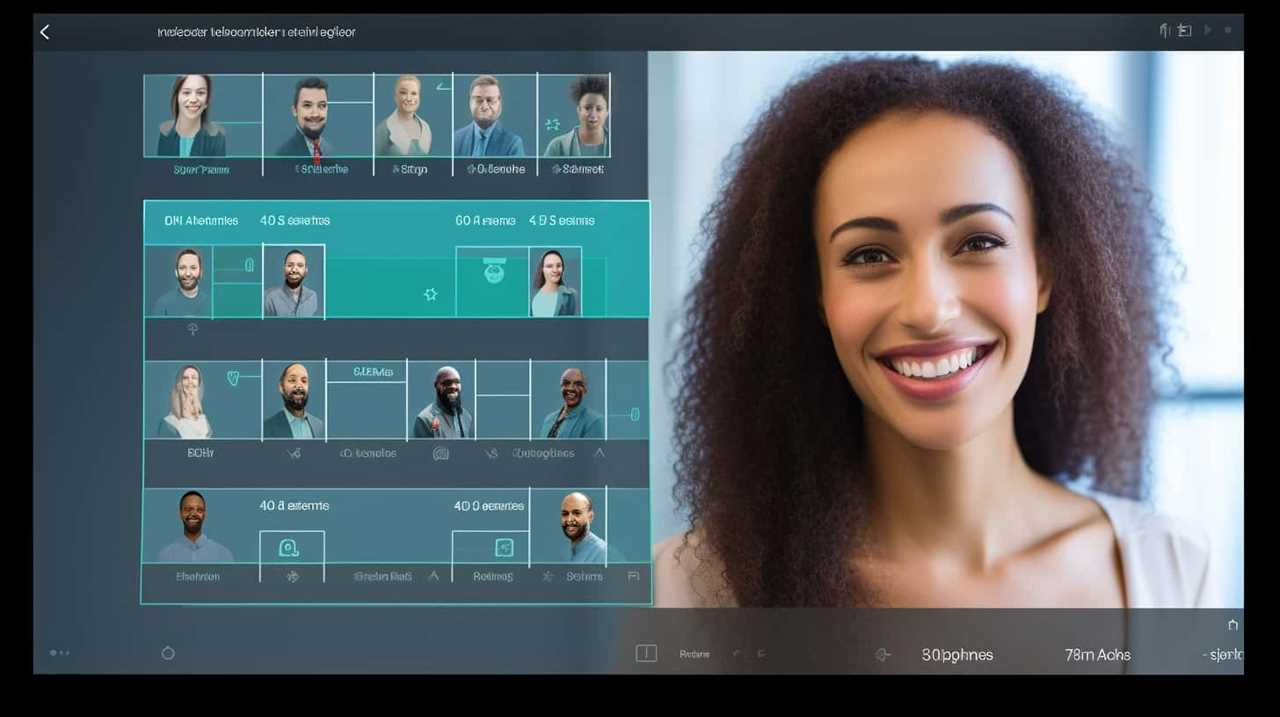
Get ready to be amazed by the surprising benefits AI brings to the world of healthcare.
Key Takeaways
- AI enables efficient analysis of vast amounts of medical data and facilitates precise and personalized treatment decisions.
- AI improves patient outcomes and delivers precise treatments by analyzing patient data to make personalized treatment recommendations.
- AI automates routine tasks, optimizes workflow, and streamlines administrative tasks, reducing costs and improving efficiency.
- AI enables early disease detection and prevention by remote monitoring of patients’ vital signs, analyzing data to make accurate risk predictions, and providing preventive measures.
Improved Diagnosis and Treatment Accuracy
Improved diagnosis and treatment accuracy can be achieved with the help of AI. AI allows us to analyze vast amounts of medical data more efficiently and effectively. AI algorithms have the ability to process and interpret complex medical information. This enables healthcare professionals to make more precise and personalized treatment decisions.
Precision medicine, which tailors medical interventions to individual patients based on their unique characteristics, can greatly benefit from AI technologies. By leveraging AI algorithms, doctors can analyze patients’ genetic information, medical records, and other relevant data to identify patterns and make accurate diagnoses.
This can lead to earlier detection of diseases, more targeted treatments, and improved patient outcomes. AI also has the potential to enhance the efficiency of treatment planning and monitoring. It can optimize the use of resources and reduce healthcare costs.
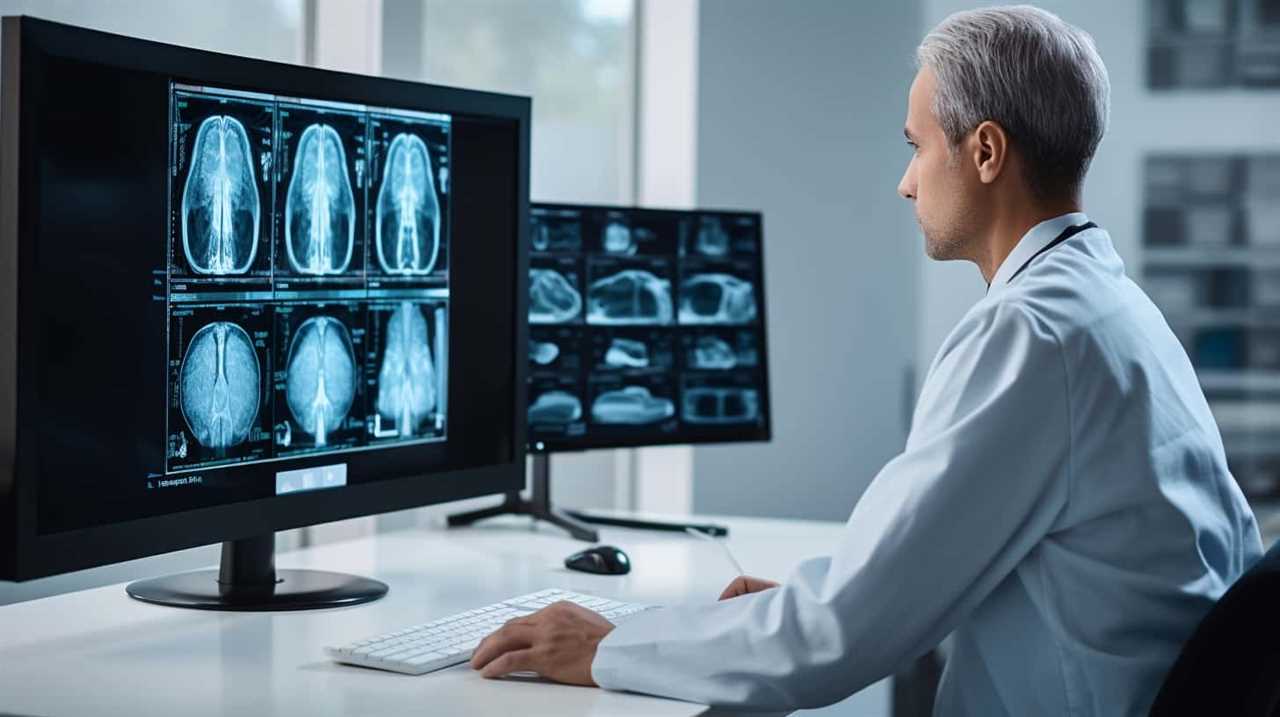
With AI’s ability to analyze large datasets and provide actionable insights, the future of healthcare holds great promise for improved diagnosis and treatment accuracy.
Enhanced Patient Care and Personalized Medicine
AI plays a crucial role in enhancing patient care and enabling personalized medicine. By leveraging AI technologies, healthcare providers can improve patient outcomes and deliver more precise treatments.
AI algorithms can analyze large amounts of patient data, including medical records, genetic information, and lifestyle factors, to identify patterns and make personalized treatment recommendations. This approach, known as precision medicine, allows healthcare professionals to tailor treatments to individual patients, increasing the chances of successful outcomes while minimizing adverse effects.
AI can also assist in monitoring patient progress, predicting disease progression, and alerting healthcare providers to potential issues. By providing personalized and proactive care, AI has the potential to revolutionize healthcare and improve patient experiences.

With enhanced patient care as a foundation, AI can also contribute to streamlined administrative tasks and efficiency in healthcare settings.
Streamlined Administrative Tasks and Efficiency
By automating routine tasks and streamlining processes, AI can optimize workflow and improve overall efficiency in healthcare settings. This can be particularly beneficial in streamlining administrative tasks and reducing costs.
- Automated Scheduling:
- AI can efficiently manage and schedule appointments, ensuring optimal utilization of healthcare resources and reducing waiting times for patients.
- By analyzing past patterns and patient preferences, AI can also suggest suitable time slots for appointments, minimizing scheduling conflicts.
- Cost Reduction:
- AI can assist in managing inventory and supply chain, ensuring that healthcare facilities have the necessary resources without excessive stockpiling.
- AI-powered systems can also help in identifying billing errors and fraud, reducing financial losses and improving revenue cycle management.
Early Disease Detection and Prevention
We can revolutionize healthcare by harnessing the power of AI for early disease detection and prevention.
One significant way AI can contribute to this is through remote monitoring. With the help of AI systems, healthcare providers can remotely monitor patients’ vital signs, symptoms, and health data in real-time. This allows for early detection of any abnormal patterns or warning signs that may indicate the presence of a disease or potential health risks.

Furthermore, AI algorithms can analyze large amounts of data to make accurate risk predictions. By identifying high-risk individuals, healthcare professionals can intervene early, provide preventive measures, and potentially save lives.
AI’s ability to continuously analyze and interpret data can greatly enhance our ability to detect diseases at their earliest stages, improving outcomes and reducing healthcare costs.
Advancements in Medical Research and Drug Development
To continue our exploration of the transformative potential of AI in healthcare, let’s delve into the numerous advancements that have been made in medical research and drug development. AI has played a pivotal role in revolutionizing these fields, leading to breakthroughs in precision medicine and streamlining clinical trials.
Precision Medicine:
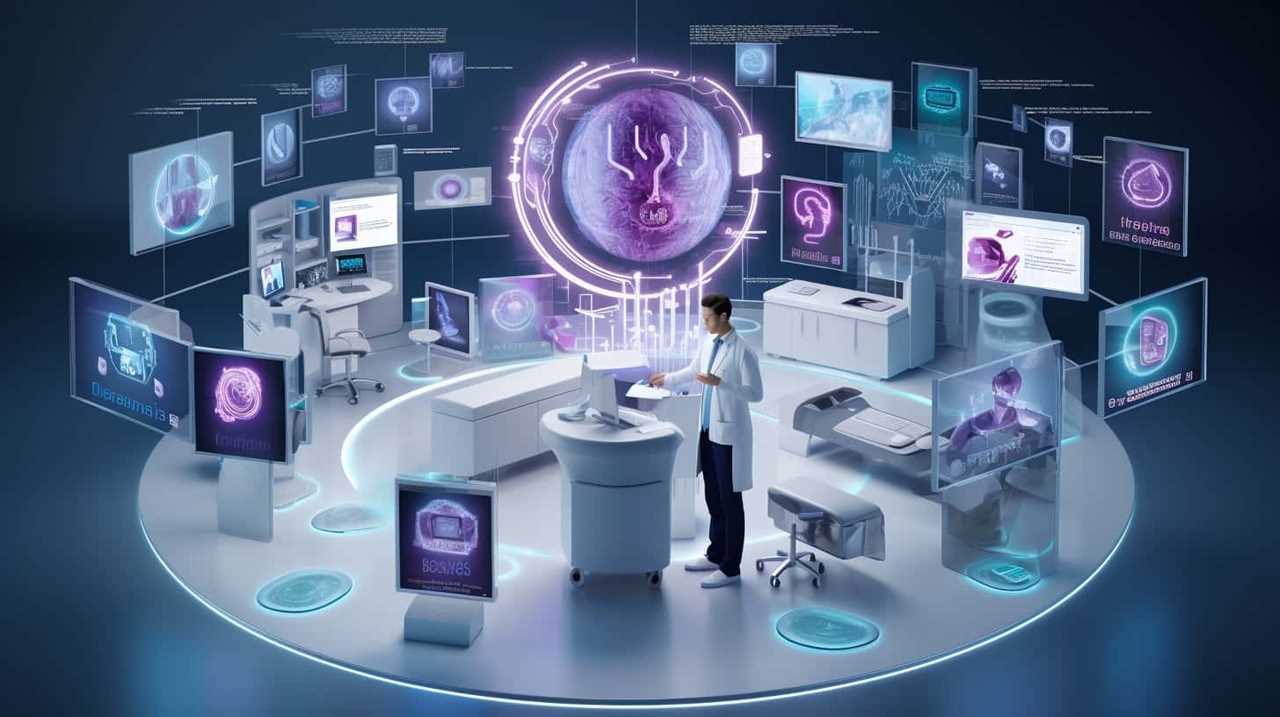
- AI algorithms can analyze large amounts of patient data, including genetic information, to identify patterns and develop personalized treatment plans.
- This approach has the potential to improve patient outcomes by tailoring treatments to individuals based on their unique characteristics.
Clinical Trials:
- AI can accelerate the process of identifying suitable candidates for clinical trials, making it more efficient and cost-effective.
- By analyzing vast amounts of data, AI algorithms can identify potential drug candidates and predict their effectiveness, reducing the time and resources required for drug development.
These advancements highlight how AI is transforming medical research and drug development, paving the way for more effective and personalized healthcare solutions.
Frequently Asked Questions
How Does AI Contribute to Improved Diagnosis and Treatment Accuracy in Healthcare?
Incorporating AI in clinical decision making improves patient outcomes by enhancing diagnosis and treatment accuracy. AI algorithms analyze vast amounts of medical data, identify patterns, and provide evidence-based recommendations for healthcare providers.
What Are the Benefits of Enhanced Patient Care and Personalized Medicine Through Ai?
Enhanced patient care and personalized medicine through AI offer significant benefits. For example, AI-driven precision medicine can analyze vast amounts of patient data to identify individualized treatment plans, optimizing outcomes and improving the patient experience.

How Can AI Streamline Administrative Tasks and Improve Efficiency in Healthcare?
Automating processes and reducing errors, AI can streamline administrative tasks and improve efficiency in healthcare. By utilizing advanced algorithms and machine learning, we can optimize resource allocation and enhance overall productivity.
What Role Does AI Play in Early Disease Detection and Prevention?
AI plays a crucial role in early disease detection and prevention. Through AI in telemedicine and remote patient monitoring, it helps healthcare providers identify potential health risks and intervene early, leading to improved patient outcomes.
What Advancements in Medical Research and Drug Development Have Been Made Possible Through Ai?
Advancements in precision medicine and the use of AI in clinical trials have led to breakthroughs in medical research and drug development. These technologies have improved efficiency, accuracy, and personalized treatment options.
Conclusion
In conclusion, it’s clear that AI has the potential to revolutionize healthcare. With its ability to improve diagnosis accuracy, enhance patient care, streamline administrative tasks, and advance medical research, the benefits are undeniable.
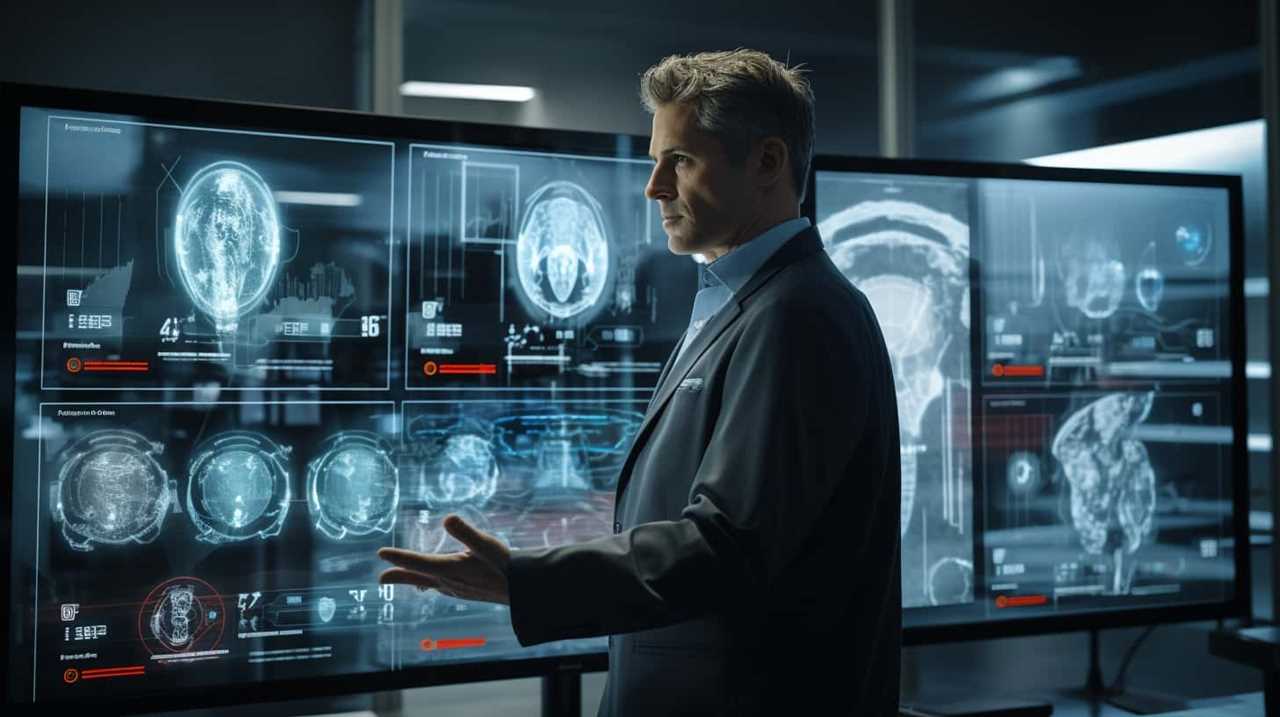
So let’s welcome our new AI overlords with open arms and rejoice in the wonders they bring. After all, who needs human doctors when we’ve algorithms to save the day?
Just kidding, but seriously, AI is changing the game and we should embrace it.



